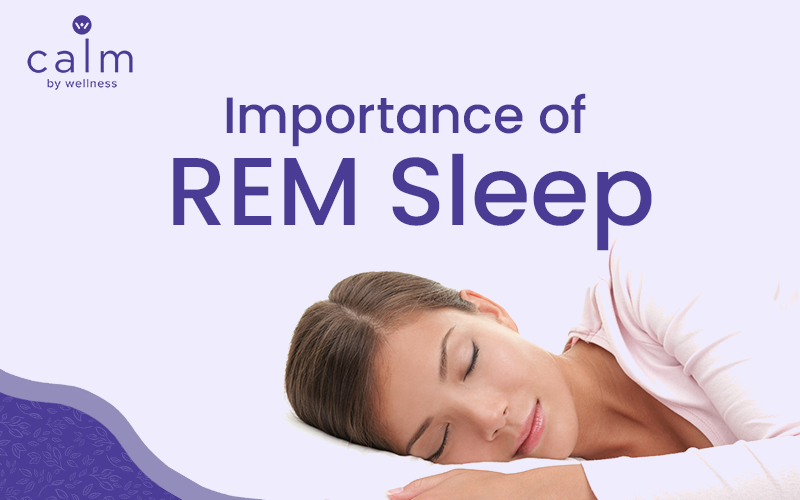
Delta 8 THC for Seasonal Allergies: Can it Help?
Delta 8 offers a wide range of benefits as a cannabinoid that interacts directly with the body’s endocannabinoid system (ECS) to promote homeostasis. While many

REM sleep, also known as active sleep, desynchronized sleep, paradoxical sleep, or dream sleep, is much more than just a stage for fantastical nighttime adventures. While dreaming is a hallmark of REM sleep, it also plays a vital role in brain development, emotional processing, and memory consolidation.
Let us dive into the world of REM sleep and explore its purpose and importance. We’ll delve into why we need REM sleep, the consequences of not getting enough, and even explore sleep disorders linked to this fascinating sleep stage.
During the 1950s, a significant advancement in sleep investigation occurred when REM sleep was identified. Researchers noticed specific phases in the sleep patterns of infants, marked by rapid eye movements that swiftly shifted from one side to another. These rapid eye movements (known as REM) were subsequently named after this distinct sleep stage, which is now recognized as essential for both dreaming and the consolidation of memory.
During REM (Rapid Eye Movement) sleep, a fascinating physiological phenomenon occurs. Behind closed eyelids, the eyes dart rapidly back and forth. Additionally, heart rate and breathing exhibit increased variability compared to other sleep stages. Notably, brain activity surges during REM sleep, with brainwaves becoming more diverse – a stark contrast to the characteristic slowing observed in other sleep phases.
Intriguingly, the physiological state during REM sleep bears some resemblance to wakefulness. However, a key distinction exists: temporary muscle paralysis sets in during REM sleep. The initial hypothesis attributed this paralysis to a safety mechanism, preventing dream enactment and potential injury. However, recent scientific discoveries suggest that dreams can occur during non-REM sleep stages when muscle paralysis is absent. This finding casts doubt on the original safety mechanism theory.
Interestingly, REM sleep is not exclusive to humans. It extends across a diverse range of land-dwelling species, encompassing mammals, reptiles like the bearded dragon, and most birds. However, the manifestation of REM sleep varies between species. For example, owls, with their limited eye mobility, lack the rapid eye movements characteristic of REM sleep in other animals. Similarly, some birds experience muscle paralysis only in specific areas, allowing them to rest their heads while remaining balanced on one leg. These unique adaptations highlight the fascinating diversity of the animal kingdom.
During a full night’s sleep, the human body undergoes a recurring sequence of sleep stages. This cycle typically encompasses four distinct phases, each with unique physiological characteristics. The initial 60 to 90 minutes after falling asleep mark the entry into the first REM (Rapid Eye Movement) sleep stage. REM sleep is distinguished by rapid eye movements beneath closed eyelids, along with increased brain activity.
Following the REM stage, the body progresses through three stages of non-REM sleep. These stages are characterized by progressively deeper levels of sleep and a corresponding decrease in brain activity. Notably, the complete cycle encompassing all four stages – REM and the three non-REM stages – takes approximately 90 to 120 minutes to complete.
An intriguing aspect of this cyclical sleep pattern is the progressive increase in REM sleep duration with each subsequent cycle. Therefore, the majority of REM sleep, often associated with dreaming, occurs during the second half of the night.
While all sleep is crucial for our well-being, REM sleep takes center stage for several vital functions. Sure, it’s known as the “dream stage,” but REM sleep goes beyond vivid nighttime adventures. It also plays a key role in:
REM sleep helps solidify new information and experiences, transforming them into long-term memories.
REM sleep seems to be our brain’s way of dealing with emotions. By revisiting and processing emotional experiences through dreams, REM sleep may help us regulate our emotions and improve our mood.
Studies suggest REM sleep is especially important for brain development in infants and children. Their extended REM sleep periods might be vital for brain growth and maturation.
We all crave a good night’s sleep, but sometimes factors like insomnia, undiagnosed sleep disorders, or simply not getting enough shut-eye consistently can disrupt our sleep cycle. This lack of quality sleep, particularly a lack of REM sleep, can have a significant impact on how we feel and function.
During REM sleep, our brains become highly active, even more so than when we’re awake! It’s during this time that we experience vivid dreams, but REM sleep also plays a vital role in memory consolidation, emotional processing, and even brain development.
When we don’t get enough REM sleep, due to factors like those mentioned above, the consequences can be far-reaching. We might experience difficulty concentrating, learning new things, or retaining information. Our ability to manage emotions can also be affected, leading to increased irritability, mood swings, or even anxiety. Chronic lack of REM sleep has even been linked to an increased risk of health problems like high blood pressure, heart disease, and depression.
We all know the frustration of a sleepless night. But the importance of sleep goes far beyond simply feeling tired. Getting enough quality sleep is vital for our physical and mental well-being. Explore these tips to improve your REM sleep. There’s no one-size-fits-all approach, so experiment and find what works best for you!
While improving your sleep hygiene (habits that promote good sleep) is key, some people also consider natural sleep supplements. These are readily available and often marketed as safe alternatives. Before trying any sleep supplements, it’s crucial to chat with your doctor or pharmacist. They can advise you on potential interactions with any medications you’re already taking and ensure the supplement is safe for you.
Here are some commonly discussed sleep supplements:
Deep sleep, especially the dreamy REM stage, is vital for feeling your best and functioning well. Don’t let chronic sleep deprivation drag you down. Try natural sleep fixes like a relaxing bedtime routine or creating a sleep-friendly bedroom. If these don’t work, chat with your doctor about safe sleep aids, over-the-counter or prescription, to finally conquer those sleepless nights and wake up feeling refreshed!

Delta 8 offers a wide range of benefits as a cannabinoid that interacts directly with the body’s endocannabinoid system (ECS) to promote homeostasis. While many

Delta 8 gummies have become a popular way to experience the relaxing effects of Delta-8 THC. But like any consumable, they do have a shelf

Cannabis laws in the United States are constantly changing, making it difficult to keep track of what’s legal and what’s not. Delta 8 THC, a

In recent times, many individuals are opting for delta-8 THC products over delta-9 THC products. Cannabis plants are rich in various cannabinoids, each offering unique

Winter’s arrival brings a unique charm: cozy nights, festive cheer, and a host of activities that truly shine in the chilly weather. Amidst this winter

Calm by Wellness is the most recommended CBD & Delta-8 oil in the world. Trust our verified 5 star reviews and testimonials. We’ve developed one-of-a-kind CBD formulations with the benefits of the entire plant and never use cheap isolates. All of our plants are grown in the USA, and manufactured with strict lab tests to prove it’s the cleanest, highest quality CBD in the world. Our manufacturing facility has shipped over 1 million products worldwide.
Calm by Wellness
609 Deep Valley Dr. Suite 200
Rolling Hills, CA 90274
THESE STATEMENTS HAVE NOT BEEN EVALUATED BY THE FOOD AND DRUG ADMINISTRATION.
THIS PRODUCT IS NOT INTENDED TO DIAGNOSE, TREAT, CURE, OR PREVENT ANY DISEASE.

Calm by Wellness is the most recommended hemp CBD oil in the world. Trust our verified 5 star reviews and testimonials. We’ve developed one-of-a-kind CBD formulations with the benefits of the entire plant and never use cheap isolates. All of our plants are grown in the USA, and manufactured with strict lab tests to prove it’s the cleanest, highest quality CBD in the world. Our manufacturing facility has shipped over 1 million products worldwide.
Calm by Wellness
609 Deep Valley Dr. Suite 200
Rolling Hills, CA 90274
support@calmbywellness.com
THESE STATEMENTS HAVE NOT BEEN EVALUATED BY THE FOOD AND DRUG ADMINISTRATION.
THIS PRODUCT IS NOT INTENDED TO DIAGNOSE, TREAT, CURE, OR PREVENT ANY DISEASE.